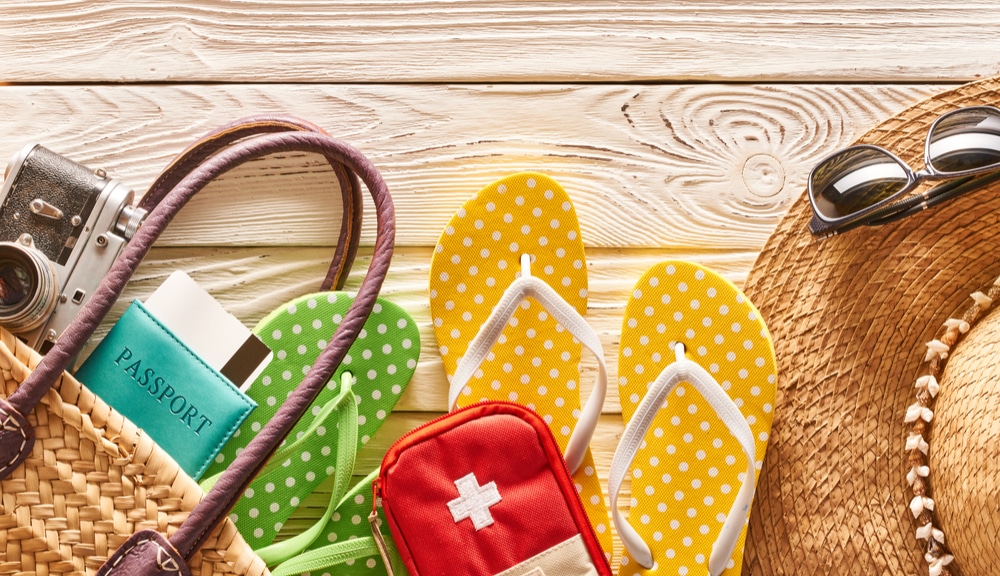
Is it time to pack for your next holiday? Whilst it may be tempting to cram your bag full of new outfits, shoes and books, it’s important to leave some space for those first aid essentials that you might just need in an emergency.
With over 70 million visits abroad taken by UK residents, most people have a safe trip and those who do not can usually be self-treated for a minor illness or accident. Having a first aid kit handy will save you time, money and inconvenience.
So, what shouldn’t you travel without?
Pain Relief
Pack some painkillers like paracetamol, aspirin or ibuprofen so minor pain like a headache doesn’t ruin your holiday. Stronger painkillers, such as codeine, may be illegal in some countries so check their regulations with the embassy in the UK before you go. Also, consider who you are travelling with, for example aspirin is not recommended for children and ibuprofen can sometimes set off asthma.
Allergy Relief
Make sure antihistamine tablets and cream are on your list, especially if you already suffer from allergies. They’re vital in reducing and soothing itchiness and inflammation, whether from allergies or insect bites. It’s best to buy non-drowsy tablets, so you don’t miss out on your holiday!
Antiseptic Wipes or Cream
The best way to clean any cuts or grazes is by using an antiseptic wipe or cream. This will help to prevent infection, especially in hot environments where germs spread quickly.
Plasters, Dressings & Bandages
A multipack box of plasters for minor cuts and grazes will come in useful, helping to prevent infection, especially if you are travelling with little ones. For more serious wounds or sprains, a dressing and bandage may be needed in the first instance, but it is also advised to seek medical assistance.
Diarrhoea Relief & Rehydration
It’s quite common to get an upset stomach when abroad, as food poisoning microbes grow and reproduce faster in hot weather. You’ll want to carry some diarrhoea relief tablets and rehydration sachets, otherwise it could ruin your trip. This is essential for young children and the elderly who are more susceptible to dehydration.
Indigestion & Heartburn Relief
Pack some antacids, available as chewable tables, which help neutralise the acid in your stomach to relieve indigestion and heartburn. These are more likely to occur on holiday as you’re eating a lot of different foods.
Mosquito Repellent
Avoid those pesky mosquito bites by using insect repellents containing DEET, particularly during the evenings when they are most likely to bite. Depending on where you are travelling to, you may also want to consider using a mosquito net. Both DEET spray and nets are available to purchase at our clinics, subject to availability.
Sun Protection & After Sun
When it comes to sunburn, prevention is better than cure. Choose the right level of sun protection for your skin type and destination, including extra protection for children, and cover up or avoid the sun when it’s at its hottest. Have some after sun lotion handy too, which will moisturise your skin after exposure to the sun or help soothe sunburn. If you do get burned, try to keep out of the sun and apply after sun lotion every hour or so, plus drink plenty of water.
Condoms
To reduce the chance of an unwanted pregnancy or getting a sexually transmitted disease, take some good-quality condoms with you, as the ones available abroad may not be fit for purpose.
Scissors, Safety Pins & Tweezers
A pair of scissors along with safety pins will be needed to cut and secure any bandages, whilst tweezers are ideal for removing splinters or grit from a wound. Remember to pack these items in your hold luggage as aircraft cabins have restrictions on sharp objects.
Other Items
You should consider taking hand sanitiser, in case you need to sterilise your hands on the go. Anti-sickness tablets and bands may also come in useful if you suffer with motion sickness or nausea. And, if you’re travelling to more remote parts of the world, you may want to bring malaria tablets, a water purification kit and sterile syringes – these are available to purchase at our clinics, subject to availability.
If you’re unsure about the suitability of any medication in this list or have any other travel health questions, book an appointment with one of our travel health experts where they can give you the best help and advice. It’s also recommended that you have any necessary vaccinations ahead of your trip to prevent any serious illnesses.

Article last reviewed on 21/03/2019 by:
Amanda Yerby RN
Clinical Director for NHS Programmes
Having gained a Bachelor of Nursing degree from the University of South Australia, Amanda worked in acute healthcare, specialising in general medical and emergency care. She has spent the past 14 years specialising in travel health and primary care, gaining extensive experience in childhood and travel immunisations, both within the private sector and the NHS.



